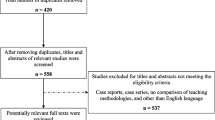Abstract
Background
Cardiopulmonary resuscitation (CPR) requires well-trained medical personnel. Multiple learning methods can be done for CPR skills training. This study aimed to compare self-deliberate practice (SDP) method and directed learning (DL) method to improve basic life support (BLS) knowledge and CPR skill performance in medical students.
Methods
This is an experimental, single-blind, randomized controlled trial study of 40 medical students from February to July 2019. Forty subjects were randomly assigned into SDP and DL groups through a voluntary sampling method. Both groups attended a 1-day course and then practiced once a month for 3 months. The DL group had practice sessions with assigned tutors, while the SDP group had to practice by themselves. Examination of BLS knowledge and CPR performance quality (compression depth, rate, and performance score) was collected before and after course lecture, after a skills training, 3 and 6 months after training.
Results
Subject characteristics of both groups were comparable. Significant knowledge and skill improvement were found in the DL group and the SDP group when compared to their knowledge and skill before training. There were no significant differences between both groups in BLS knowledge and CPR performance quality in all examination periods.
Conclusion
Both SDP and DL teaching methods show significant improvement and excellent retention in BLS knowledge and high-quality CPR performance. These two learning methods are both feasible and bring positive results for students.




Similar content being viewed by others
Data Availability
The authors confirm that the data supporting the findings of this study are available within the article. Raw data that support the findings of this study are available from corresponding author, upon reasonable request.
References
What is CPR [Internet]. cpr.heart.org. 2020 [cited 4 August 2020]. Available from: https://cpr.heart.org/en/resources/what-is-cpr.
Perkins GD, Boyle W, Bridgestock H, Davies S, Oliver Z, Bradburn S, Green C, Davies RP, Cooke MW. Quality of CPR during advanced resuscitation training. Resuscitation. 2008;77:69–74.
Part 3: adult basic life support. Circulation [Internet]. Ahajournals.org. 2018 [cited 4 August 2020]. Available from: https://www.ahajournals.org/doi/full/https://doi.org/10.1161/circ.102. suppl_1. I-22.
Husebø SIE, Bjørshol CA, Rystedt H, Friberg F, Søreide E. A comparative study of defibrillation and cardiopulmonary resuscitation performance during simulated cardiac arrest in nursing student teams. Scandinavian J Trauma, Resuscitation Emerg Med. 2012;20:23.
García-Suárez M, Méndez-Martínez C, Martínez-Isasi S, Gómez-Salgado J, Fernández-García D. Basic life support training methods for health science students: a systematic review. Int J Environ Res Public Health. 2019;16(5):768.
Martin P, Theobald P, Kemp A, Maguire S, Maconochie I, Jones M. Real time feedback can improve infant manikin cardiopulmonary resuscitation by up to 79% - a randomized control trial. Resuscitation. 2013;84:1125–30.
Meaney PA, Sutton RM, Tsima B, Steenhoff AP, Shilkofski N, Boulet JR, et al. Training hospital providers in Basic CPR skills in Botswana: acquisition, retention and impact of novel training techniques. Resuscitation. 2012;83:1484–90.
Hamilton R. Nurses’ knowledge and skill retention following cardiopulmonary resuscitation training: a review of the literature. J Adv Nurs. 2005;51:288–97.
Partiprajak S, Thongpo P. Retention of basic life support knowledge, self-efficacy and chest compression performance in Thai undergraduate nursing students. Nurse Educ Pract. 2016;16:235–41.
Ericsson KA, Krampe RT, Tesch-Romer C. The role of deliberate practice in the acquisition of expert performance. Psychol Rev. 1993;100(3):363–406.
Tran VD. The effects of cooperative learning on the academic achievement and knowledge retention. Int J Higher Ed. 2014;3(2):131–40.
Mozaffarian D, Benjamin EJ, Go AS, Arnett DK, Blaha MJ, Cushman M, et al. Executive summary: heart disease and stroke statistics—2015 update. Circulation. 2015;131:434–41.
Roppolo L, Heymann R, Pepe P, Wagner J, Commons B, Miller R, et al. A randomized controlled trial comparing traditional training in cardiopulmonary resuscitation (CPR) to self-directed CPR learning in first year medical students: the two-person CPR study. Resuscitation. 2011;82(3):319–25.
Ali D, Hisam B, Shaukat N, Baig N, Ong M, Epstein J, et al. Cardiopulmonary resuscitation (CPR) training strategies in the times of COVID-19: a systematic literature review comparing different training methodologies. Scandinavian J Trauma, Resuscitation Emerg Med. 2021;29(1).
Berger C, Brinkrolf P, Ertmer C, Becker J, Friederichs H, Wenk M, et al. Combination of problem-based learning with high-fidelity simulation in CPR training improves short and long-term CPR skills: a randomised single blinded trial. BMC Med Ed. 2019;19(1).
Al-Jundi W, Elsharif M, Anderson M, Chan P, Beard J, Nawaz S. A randomized controlled trial to compare e-feedback versus “standard” face-to-face verbal feedback to improve the acquisition of procedural skill. J Surg Educ. 2017;74(3):390–7.
Smart J, Kranz K, Carmona F, Lindner T, Newton A. Does real-time objective feedback and competition improve performance and quality in manikin CPR training – a prospective observational study from several European EMS. Scandinavian J Trauma, Resuscitation Emerg Med. 2015;23(1).
Funding
Financial support for this study is from IMERI Cluster Grant to support medical education development in the Faculty of Medicine Universitas Indonesia. The financial support aids in designing the study, collecting the data, and writing the manuscript.
Author information
Authors and Affiliations
Corresponding author
Ethics declarations
Ethical Approval
This study has obtained ethical approval from the Ethics Committee of the Faculty of Medicine, Universitas Indonesia/Cipto Mangunkusumo Hospital on October 20th, 2020, exemption letter No. 1291/UN2.F1/ETIK/2018.
Conflict of Interest
The authors declare no competing interests.
Additional information
Publisher's Note
Springer Nature remains neutral with regard to jurisdictional claims in published maps and institutional affiliations.
Supplementary Information
Below is the link to the electronic supplementary material.
Rights and permissions
Springer Nature or its licensor (e.g. a society or other partner) holds exclusive rights to this article under a publishing agreement with the author(s) or other rightsholder(s); author self-archiving of the accepted manuscript version of this article is solely governed by the terms of such publishing agreement and applicable law.
About this article
Cite this article
Sianipar, I.R., Tantri, A.R., Muktiarti, D. et al. Comparison Between Self-Deliberate Practice and Directed Learning Training Methods for Basic Life Support Knowledge and High-Quality Cardiopulmonary Resuscitation Skill Retention in Second-Year Medical Students 3 and 6 Months After Training. Med.Sci.Educ. 33, 395–400 (2023). https://doi.org/10.1007/s40670-023-01746-7
Accepted:
Published:
Issue Date:
DOI: https://doi.org/10.1007/s40670-023-01746-7




